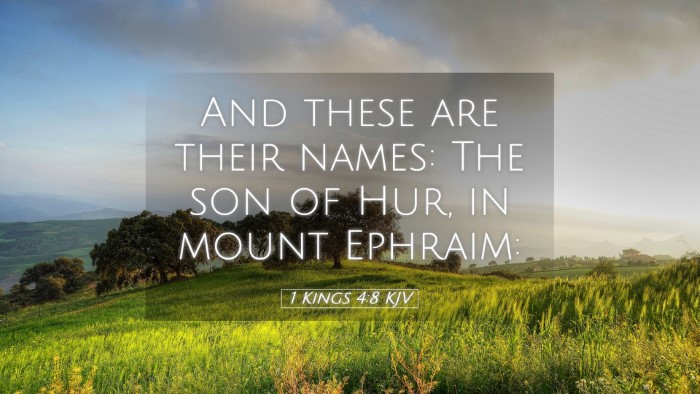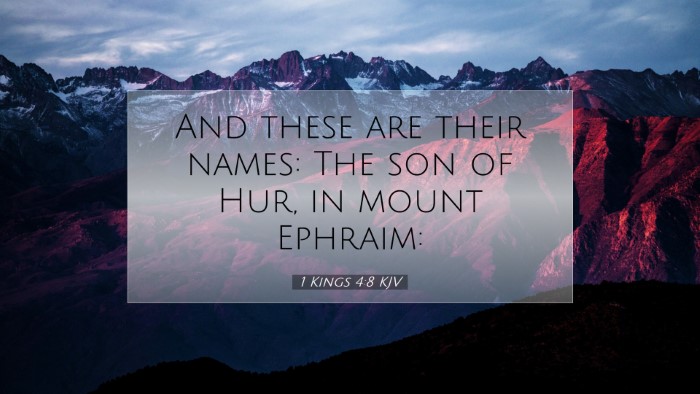1 Kings 4:8 (KJV): "And these are their names: The son of Ahilud, this is the recorder."
Commentary on 1 Kings 4:8
This verse is part of a larger narrative detailing the organization of King Solomon's administration. The mention of the recorder signifies the importance of record-keeping in governance, a practice essential for accountability and historical reference.
Historical Context
Matthew Henry's Commentary highlights that during Solomon’s reign, the kingdom was flourishing and in need of a robust administrative structure to maintain its prosperity. The selection of officials was crucial for implementing the king's policies effectively.
The phrase "And these are their names" indicates that Solomon’s governance was systematic and intentional. Each official played a significant role in ensuring the stability and functionality of the kingdom. This is reflective of a well-organized political environment that was characteristic of ancient Near Eastern monarchies.
Roles and Responsibilities
Albert Barnes’ Notes elaborates on the various roles filled in Solomon’s administration. The presence of a recorder signifies the need for documentation of both state affairs and royal decrees, ensuring transparency and continuity in governance.
This administrative structure not only bolstered Solomon's rule but also served the purpose of establishing a legacy through properly maintained archives that would inform future generations about the kingdom's affairs.
The Significance of the Recorder
According to Adam Clarke's Commentary, the role of the recorder was particularly notable in the context of ancient Israelite society. By appointing an official to document events, Solomon emphasized the value of history and memory within the nation.
This emphasis on record-keeping can be linked to theological underpinnings of accountability before God, as well as the importance of cultural memory in shaping the identity of the Israelite people. The recorder's role can also be seen as participating in the divine narrative, where every event and decision is significant in the unfolding plan of God.
Theological Implications
The appointment of officials, including the recorder, can be interpreted theologically. It reflects the divine order and governance that Solomon was establishing under God’s guidance. Matthew Henry points out that such order brings to light the principle that God is a God of order, and Solomon, being wise, sought to mirror that divine attribute in his rule.
The governance structure portrays a God who cares for the administrative affairs of His people. The presence of a recorded history also raises questions about the legacy of leadership and the importance of righteousness in those who serve in positions of authority.
Practical Applications
For pastors, students, and theologians, this passage serves as a reminder of the importance of structure and organization within ministries and church governance. Albert Barnes reflects on how the effective administration in any leadership role allows for careful oversight and shepherding of God’s flock.
This can also translate into the practice of keeping records of church activities, decisions made, and resources allocated. Such transparency not only helps in good stewardship but also strengthens the trust between church leadership and its members.
- Accountability: Leaders are accountable to both God and those they serve.
- Documentation: Keeping records of decisions fosters a culture of transparency.
- Legacy: Thoughtful administration leaves a legacy that can inform and shape future generations.
Conclusion
In conclusion, 1 Kings 4:8 provides valuable insights into the nature of biblical leadership and governance. The practices established during Solomon's reign serve as a model for contemporary leadership within the Church and Christian organizations. As highlighted by Adam Clarke, the focus on order and record-keeping reflects broader theological themes of God’s sovereignty and intentionality in guiding His people through appointed leaders.
This passage encourages us to reflect on how we establish our governance structures and lead with integrity, ensuring that our actions resonate with divine principles that honor God and serve our communities.


